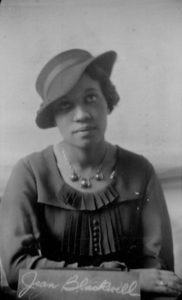
Jean Blackwell Hutson
*Jean Blackwell Hutson was born on September 7, 1914. She was a Black librarian and researcher.
From Summerfield, Florida, her father, Paul O. Blackwell, was in business as a farmer. Her mother, Sarah Myers Blackwell, was an elementary school teacher. When she was 4, she and her mother moved to Baltimore while her father remained in Florida to run his business, commuting to Baltimore to visit his family. Through her babysitter, who ran a boarding house, she met the poet Langston Hughes. Hughes was then a student at Lincoln University and went to Baltimore on weekends. Their friendship endured. He referred to her as his ''baby sister,'' when Mrs. Hutson came to Harlem as a young woman, Hughes ensured she met the leading writers and artists.
At 15, Mrs. Hutson was class valedictorian at her graduation from Douglass High School in Baltimore, then an all-black high school in a segregated system. The school had exacting standards and emphasized studying black history and literature. One of her teachers was Yolande Du Bois, the daughter of W. E. B. DuBois. She attended the University of Michigan and then switched to Barnard College. In 1935, she became the second Black woman to graduate from Barnard; the first was Zora Neale Hurston.
Hutson wanted to be a psychiatrist but took up library science, intending to finance medical studies. 1936, she received a master's degree from the Columbia University School of Library Service. Her first job was in the New York City Public Branch Library system. As a librarian in the Bronx, Mrs. Hutson noticed that few Spanish-language books would appeal to the borough's Spanish population and arranged to buy some. In 1939, she married Andy Razaf, a lyricist who wrote songs for Fats Waller. The marriage ended in divorce eight years later.
In 1948, Mrs. Hutson was asked to take over the Schomburg, based on the private library of Arthur Alphonzo Schomburg. ''I was drafted for six months to keep the Negroes quiet,'' Mrs. Hutson once said. ''People who grew up in the Depression didn't throw away jobs, so I came.'' In 1950, she married John Hutson, a fellow employee at the Countee Cullen branch library. He died in 1957. They had one daughter, Jean Frances, who died in 1992.
With the rise of the Black Power movement and the success of independence movements in Africa and the Caribbean, interest in the Schomburg grew. 1962, under her supervision, the library published the Dictionary Catalogue of the Schomburg Collection, which was put on microfilm and made its holdings known to libraries in Europe, Africa, and the Americas. Hutson's work in developing the Schomburg caught the attention of President Kwame Nkrumah of Ghana, who asked for her help in building an Africana collection at the University of Ghana.
She lived in Ghana in 1964. During the 1960s and '70s, the situation at the Schomburg grew perilous, with its collections deteriorating in the Countee Cullen branch library, a sparsely furnished, poorly lighted space without air-conditioning at 103 West 135th Street. In 1971, Hutson helped establish the Schomburg Corporation to raise money for a new building. She ''learned to go to Albany,'' as she said once in an interview. There were many politicians, Hutson said, ''who had never seen a black woman up in front of them at the legislature.''
Eventually, she helped obtain a Federal grant to construct a new building. In 1981, the new $3.7 million center finally opened, five stories tall, built of red brick and glass, climate-controlled, and with an art gallery. By then, Mrs. Hutson had retired as Schomburg's chief and had taken a job in the office of library administration at the Public Library's headquarters on 42d Street.
Today, the Schomburg Collection holds some 150,000 volumes, 3.5 million manuscripts, and the largest assemblage of photographs in the world documenting black life, and precious artifacts, including a 16th-century manuscript, ''Ad Catholicum,'' by Juan Latino, believed to be the first book written by a black man.
Hutson worked for the Schomburg Center for Research in Black Culture for 32 years, extensively researching and cataloging historical material for the New York Public Library. She also lectured on African American history at the City College of New York before retiring in 1984. Jean Blackwell Hutson died in February 1998 at the age of 83.